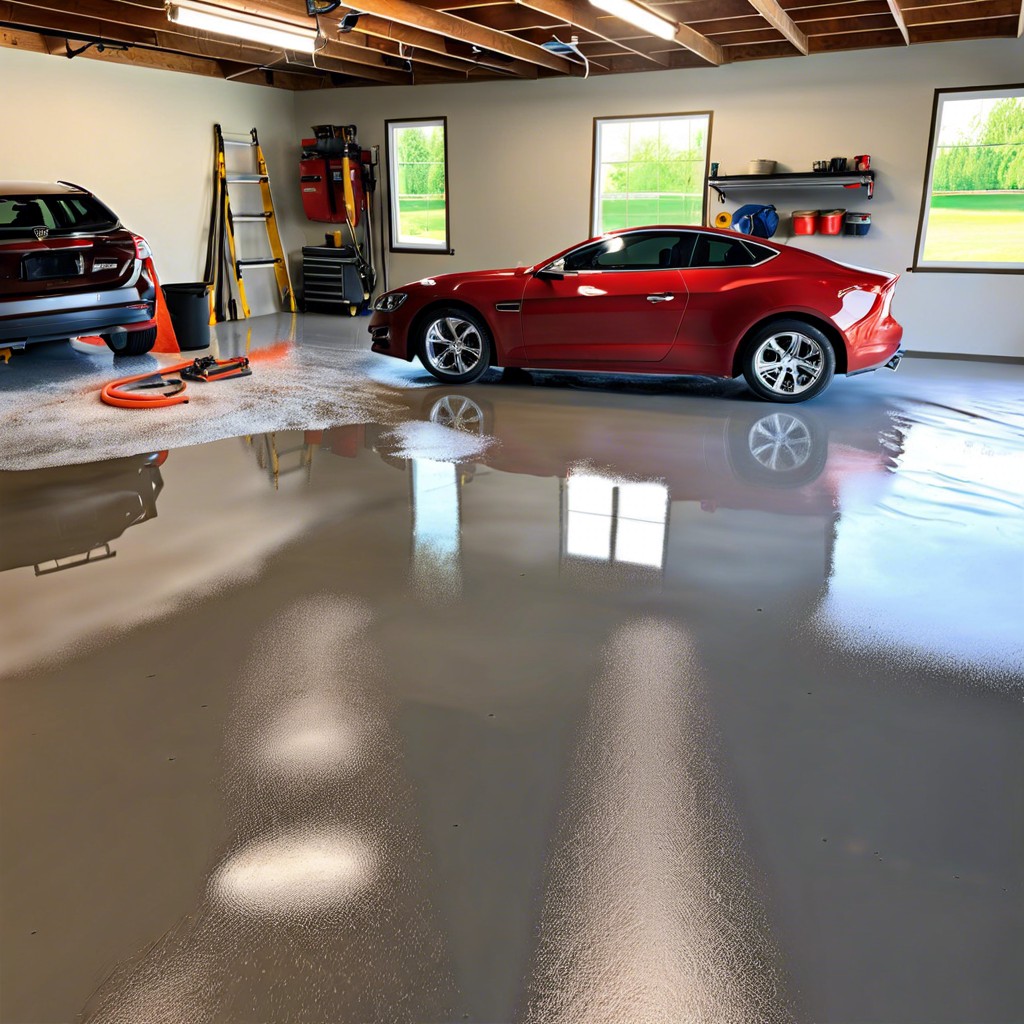Discover the approximate cost of epoxying a 2-car garage floor and gain insights into factors influencing pricing decisions.
Key takeaways:
- Location affects epoxy costs significantly.
- Floor condition may require extra prep expenses.
- Epoxy quality ranges to per square foot.
- DIY saves money but may risk poor finish.
- Material types impact pricing and durability options.
Factors Affecting Epoxy Garage Floor Cost

Location can mess with your wallet. Living in a bustling urban jungle could mean higher costs, just like the price of a latte. Meanwhile, a rural setting may save you a buck or two.
Your garage’s current condition is another sneaky culprit. A cracked or uneven floor might need some TLC before the epoxy gets to shine, and that means extra expenses.
Then there’s the quality of epoxy. Like choosing between off-brand cereal and the stuff with a prize inside, high-quality epoxy costs more, but it might save you in the long run.
Lastly, think of the floor design itself. Fancy patterns or additional accents can add a touch of dazzle but also are sure to send your budget soaring into the stratosphere. Keep an eye on those aesthetic ambitions!
Average Prices for Epoxy Garage Floors
For a typical 2-car garage, epoxy floor costs might have you scratching your head, wondering if the glittery floor is lined with gold. But fear not! Let’s break it down and keep things sensible.
Prices generally start around a rock-bottom $3 per square foot. That’s if you want something basic—just a little pizzazz. On the other hand, if you’re going full-on showroom glam with high-end materials and artistic flair, costs can climb to $12 per square foot or more.
A mid-range option often lands between $5 and $7 per square foot.
These figures include a smorgasbord of basics like surface prep, materials, and good old human effort. Of course, you’ll want to factor in a few extra bucks if your garage floor looks like the surface of the moon with craters needing repair.
Remember, Picasso didn’t paint with dull brushes, so if you wish to add colorful chips or metallic swirls, priority mail your wallet to higher figures.
Keep in mind: location, quality, and complexity of design can influence the final ticket. Your wallet appreciates the thoughtfulness.
DIY Vs. Professional Application
Rolling up your sleeves and tackling the garage floor with your own two hands can lead to significant savings. But let’s be honest, do you really want to tell your friends you spent the weekend “watching paint dry”?
On the bright side, a DIY project can cost substantially less since you bypass the labor costs. Plus, nothing beats the satisfaction of mastering new skills and telling everyone who visits about it. Just don’t forget to remove “epoxy-wrestling” from your skillset in your resume—it’s not that kind of party.
On the flip side, hiring professionals might save time and prevent your garage from looking like a Jackson Pollock painting gone wrong. They’ll bring their expertise, ensure smooth application, and use their pricey professional tools to give your floor the showroom finish of your dreams. Sure, it’s a little more costly, but you can spend the weekend watching someone else work while you sip lemonade and point.
So, weigh your options: bare biceps DIY or refined luxury with the pros? Just remember, don’t get stuck—literally.
Materials and Labor Costs
When plunging into the epoxy wonderland, brace yourself for two main expenses: materials and labor. Materials range from standard epoxy kits to high-end, designer-grade options that make your garage floor the talk of the neighborhood. Epoxy kits often include the resin, hardener, and sometimes decorative flakes if you’re feeling fancy.
- Basic Epoxy Kits: These run about $50 to $150 per gallon. A two-car garage generally requires about 3 to 5 gallons, depending on the coats.
- High-Performance Epoxy: For those who want the garage to double as an art exhibit, these could cost between $300 to $500 for the same coverage.
Now, onto labor costs. Professional labor tends to range from $3 to $7 per square foot. Prices can fluctuate based on your location and whether the contractor throws in a complimentary dance number with the service.
Lastly, bear in mind prepping the garage floor is part and parcel of labor costs. Stripping previous coatings, cleaning, and minor repairs may add to the tab. Wage peace with your wallet and brace for a shiny new floor!
Garage Floor Size and Type of Epoxy
When it comes to slapping epoxy magic on your garage floor, the size of your concrete canvas matters. A larger garage means more square footage to cover, which naturally nudges up the price. So if your garage is the size of a small basketball court, prepare to dig deeper into your pockets.
Now, onto the type of epoxy. Think of it as the ice cream of flooring choices—different flavors with different price tags.
– Solid epoxy: The luxury choice, offering durability and longevity, but at a premium cost. Because who doesn’t want their garage floor to last longer than most Hollywood careers?
– Water-based epoxy: The budget-friendly contender, great for the DIY enthusiast who’s on a budget but still wants a taste of the epoxy life.
– Solvent-based epoxy: Somewhere in the middle price-wise, it’s a bit like doing your laundry—sometimes necessary but with fumes that might make you wish for fresh air.
Choose wisely, as the wrong choice might have you slipping and sliding like a cartoon character on a banana peel.